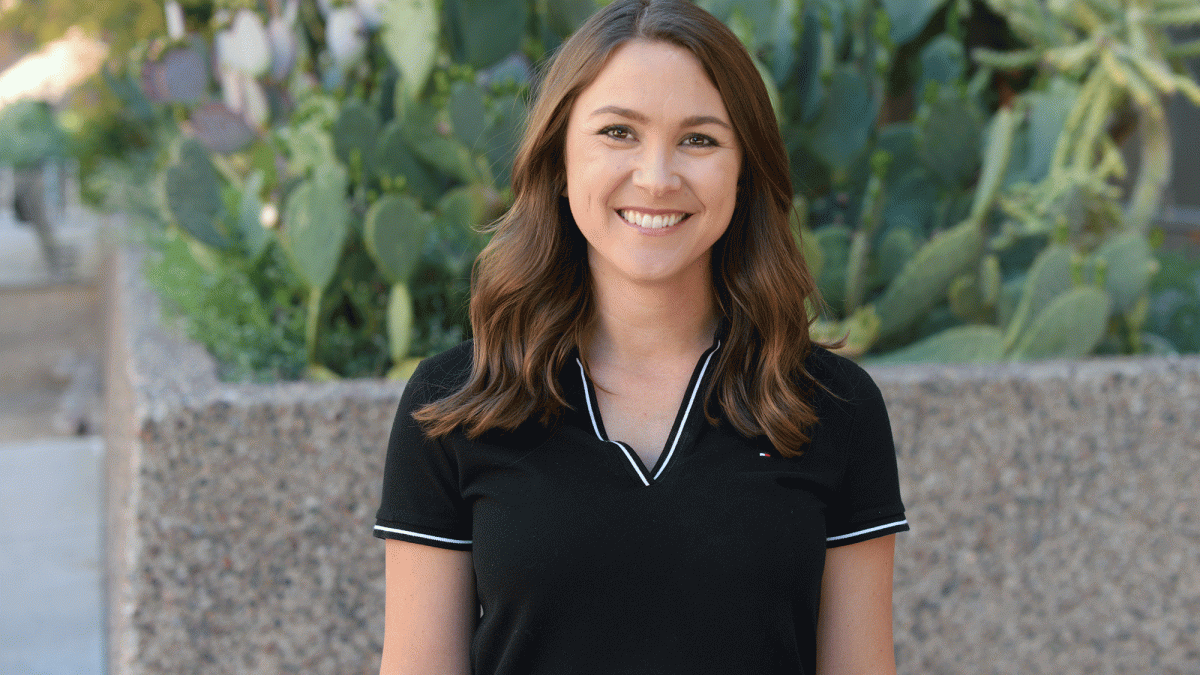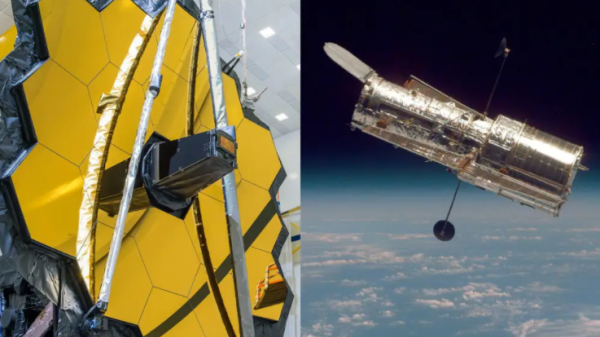Biology PhD grad gains international recognition for her research in final week of school

Katelyn Cooper, graduating with her PhD in biology, studies how to improve the way college biology is taught in active learning classrooms. Her research prompted intense international media attention the final week of school. Photo by School of Life Sciences VisLab
Editor’s note: This is part of a series of profiles for spring 2018 commencement.
With less than one week to go before defending her doctoral dissertation, Katelyn Cooper found herself in an unexpected position — smack dab in the middle of the international media spotlight.
Cooper, a native of Scottsdale, Arizona, put together a series of research studies looking at how to improve the way college biology is taught in active learning classrooms. She and her mentor, School of Life Sciences Assistant Professor Sara Brownell, study biology education. One of those studies, focused on “perceived intelligence” and the differences between genders, published in the journal Advances in Physiology Education the week of her defense.
From the minute the story hit the press, Cooper and Brownell were bombarded with media inquiries.
“We definitely did not expect this kind of media attention!” Cooper said. “I was planning to spend the few days before my thesis defense completely focused on practicing my presentation, and I never imagined that I would instead spend those days being interviewed by local, national and international news organizations about the study.
“What I learned the most from this experience was how important it is for academics to learn how to communicate with journalists — in real time, I realized that I had to come up with alternative ways of describing my work that were not as complicated, but still accurate. I wanted to stay true to my results, but I also realized that I had to effectively communicate to non-experts if I wanted people to take something away from the study,” she added.
Working with Brownell, the pair handled press inquiries from around the world, landing interviews for radio, television, newspapers, bloggers, podcasts and websites.
“When I started my PhD four years ago, my primary goal was to make a meaningful contribution to the field of undergraduate biology education,” Cooper said. “Receiving this amount of media attention and knowing that people around the world were reading about our research in the same week that I defended my PhD solidified that my goal had been met. It was incredibly exciting to have this work shared so broadly.”
Cooper ended that week by successfully defending her dissertation, despite the lack of time to practice her presentation, and earned her doctorate in biology.
Question: What was your “aha” moment, when you realized you wanted to pursue a career in your field?
Answer: I first thought about pursuing a PhD so that I could teach college biology. However, I was growing increasingly interested in understanding issues of equity and access in higher education. I began meeting with different ASU faculty to understand more about what they do. Through these meetings, I found that I could pursue a career teaching undergraduate biology and conducting biology education research, and I knew I had found what I wanted to do.
Q: What’s something you learned while at ASU — in the classroom or otherwise — that surprised you, that changed your perspective?
A: For a long time, I thought that all students in the same college class had the same opportunity to learn. As an academic adviser and later as a graduate student, I gained a deeper understanding of the financial barriers, systemic biases and cultural norms that prevent all students from receiving an equitable education.
Q: Why did you choose ASU?
A: I chose ASU because it is home to one of the most influential leaders in the field of undergraduate biology education — Dr. Sara Brownell. When I realized that I would have the opportunity to train with Sara, I couldn’t pass it up.
Additionally, I have the most wonderful family who lives in Arizona. I was very excited that I could receive an excellent education and still make it to weekly family dinner with my parents and grandparents.
Q: What’s the best piece of advice you’d give to those still in school?
A: Find a good mentor and maximize your time with them. I was fortunate to find an outstanding mentor, my PhD adviser, who was willing to truly invest in my education. She put time into developing me as a researcher and teacher, provided me with opportunities to share my work at a national level, and pushed me to exceed my own expectations. Finding a mentor was the first step, and proving that I was worthy of her time by working hard and following her advice was just as important.
Q: What was your favorite spot on campus, whether for studying, meeting friends or just thinking about life?
A: While I love spending time in ASU’s Secret Garden because of its tranquility, my favorite memories occurred in Noble Science Library where I met some of my best friends, spent a ton of time studying, and spent even more time laughing.
Q: What are your plans after graduation?
A: I will be applying to tenure-track faculty positions in biology education while doing a post-doc in ASU’s Biology Education Research Lab and continuing to run the NSF-funded LEAP Scholars Program.
Q: If someone gave you $40 million to solve one problem on our planet, what would you tackle?
A: If someone gave me $40 million, I would try to solve problems that related to inequities in undergraduate education. Specifically, I would focus on creating a more diverse and inclusive scientific community.
Q: Thinking back over your time at ASU, what challenges did you face, and how did you overcome them?
A: The biggest challenge I faced during my graduate career was working a full-time job as an academic adviser while pursuing my PhD. This meant that much of my PhD work had to be completed on nights and weekends. I learned how to be extremely efficient with my time, managed to integrate parts of my job and my research, and made sure to communicate effectively with my boss and adviser.
Q: Are there any particular people, professors, advisors or friends who really supported you on your journey — and what did they do to help?
A: My PhD adviser, Dr. Sara Brownell, is responsible for teaching me to think, write and balance many academic responsibilities, and I am incredibly indebted to her. Scot Schoenborn is the head of advising in the School of Life Sciences and was my boss while I was juggling a full-time job as an academic adviser and getting my PhD. When I told Scot I wanted to pursue my PhD and keep my job as an adviser, not only did he approve, he encouraged me. Scot remained supportive throughout my graduate career and allowed me the flexibility I needed to pursue both endeavors.
Q: What did ASU provide to you that you think you could not have found anywhere else?
A: I study equity and access in undergraduate biology education, and ASU has an incredibly diverse population of students. Our students are non-traditional in many ways; many work full-time, are raising families and commute over an hour to campus. Students come to ASU from extremely different backgrounds and hold many different identities. Getting to work at a university that is as diverse as ASU presented me with the unique opportunity to study the impact of students' identities, characteristics and backgrounds on their educational experience, which was exactly what I wanted to do.
More Science and technology

ASU receives 3 awards for research critical to national security
Three researchers in the Ira A. Fulton Schools of Engineering at Arizona State University have received grant awards under the …

Celebrating 34 years of space discovery with NASA
This year, NASA's Hubble Space Telescope (HST) is celebrating its 34th anniversary of the world's first space-based optical…

Making magic happen: Engineering and designing theme parks
The themed entertainment industry is widespread and diverse, encompassing everything from theme parks to aquariums, zoos, water…